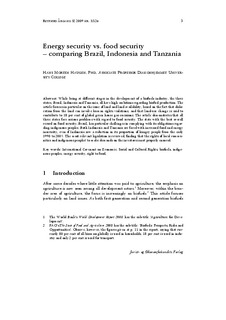| dc.description.abstract | While being at different stages in the development of a biofuels industry, the three states, Brazil, Indonesia and Tanzania, all have high ambitions regarding biofuel production. The article focuses in particular on the issue of land and land availability, based on the fact that dislocation from the land can involve human rights violations, and that land-use change is said to contribute to 18 per cent of global green house gas emissions. The article demonstrates that all three states face serious problems with regard to food security. The state with the best overall record on food security, Brazil, has particular challenges in complying with its obligations regarding indigenous peoples. Both Indonesia and Tanzania are faced with increased food and energy insecurity, even if Indonesia saw a reduction in its proportion of hungry people from the early 1990 to 2005. The most relevant legislation is reviewed, finding that the rights of local communities and indigenous peoples’ to make demands on the investors is not properly ensured. | en_US |
